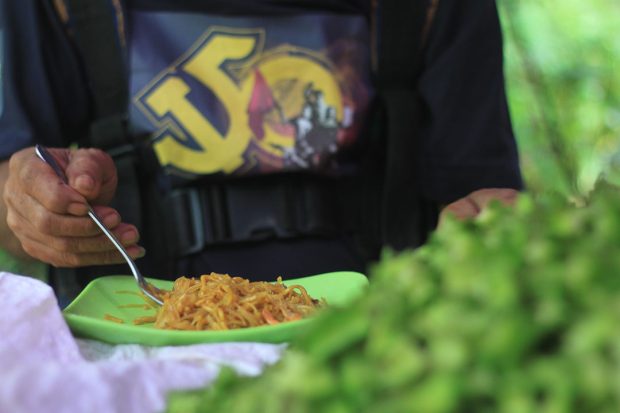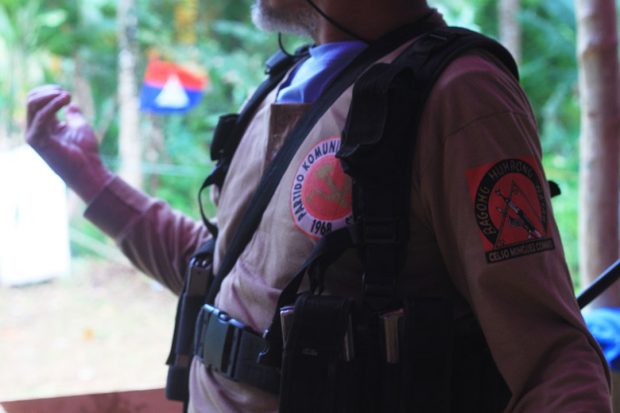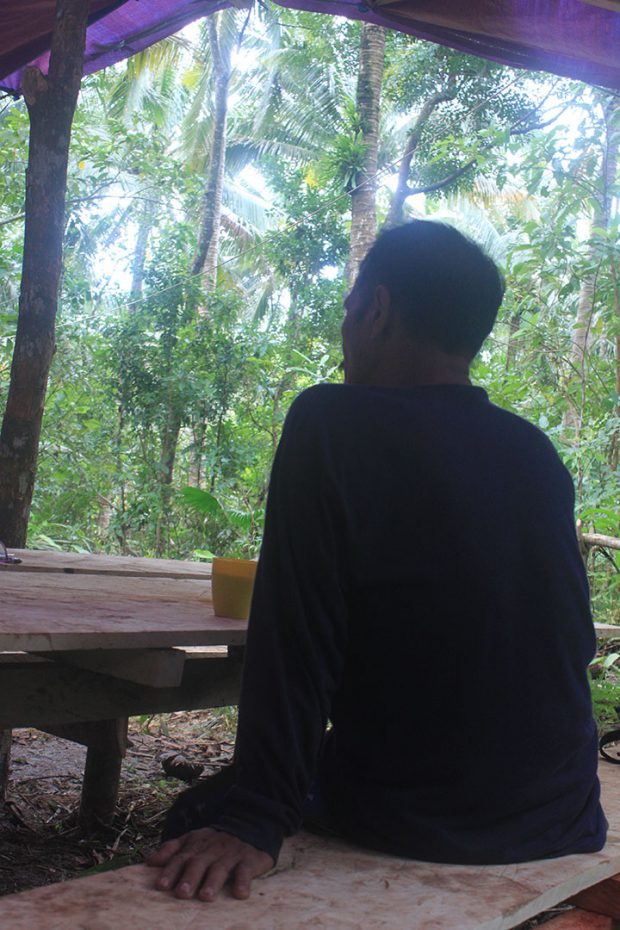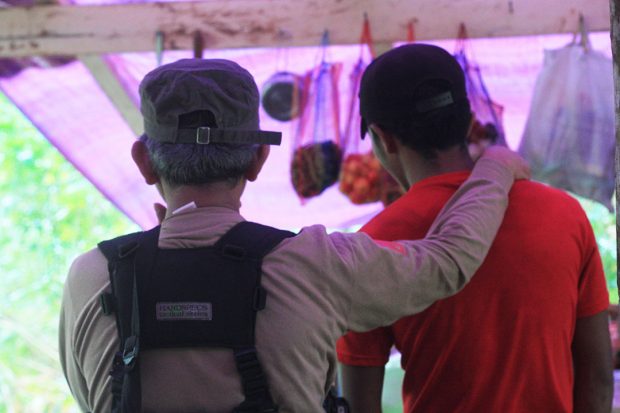A few weeks ago, President Rodrigo Duterte ordered the deployment of more troops to crush the “insurgency,” but the men and women, both old and young, of this armed revolution just laughed.
By RONALYN V. OLEA
BICOL REGION – Somewhere in the mountainous part of the region, there were makeshift huts made of freshly cut pieces of wood, leaves and plastic waterproof sheets. A few hammocks made of taffeta hung in between trees. These served as temporary sleeping quarters for the mobile army composed mainly of peasants, some workers and intellectuals.
There was a kitchen, a meeting place and a stage. Slits of bamboo were used as poles for the flags of the Communist Party of the Philippines (CPP), New People’s Army (NPA) and National Democratic Front of the Philippines (NDFP).
Electricity came from a generator. Water was sourced from the nearby brook.
The temporary camp was only a two-hour walk (for the urban-raised but less than an hour for those who know the terrain by heart) from the cemented road.
In this same region, military operations continue. A few weeks ago, President Rodrigo Duterte ordered the deployment of more troops to crush the “insurgency.” But the men and women, both old and young, of this armed revolution just laughed at their enemy’s dream.
Why such confidence? What sustains the NPA? Who supports them?
Four NPA guerrillas from different generations shared their stories.
Taking roots
The NPA prides itself as the people’s army.
Samuel Guerrero, the 69-year-old spokesperson of the NPA-Celso Minguez Command, has devoted 27 years living among the poorest. Like many NPA units, 70 percent of his time is devoted to organizing and the other 30 percent to military work.
“In some villages, the poor eat lima-lima (a Bicolano term for pig’s food) because they could not afford to buy rice. If you are immersed among the poor, your resolve to fight is strengthened all the more. Even the fatigue disappears when you are with the masses,” Guerrero said in Filipino.
He himself came from a poor peasant family. At the age of 12, Guerrero’s small hands became familiar with soil. His family cleared portions of public land and planted abaca, corn, sweet potatoes, banana and coconut. Sometime in 1975, the soldiers came and destroyed their crops. The men in uniform also accused his father of being a NPA. Out of fear, the family left and went back only in 1986.
When his father was confined in a hospital due to a disease affecting his spine, the family became deeply indebted. They were able to pay it many years after.
“The poorest just waits for death to come,” Guerrero said. “The system only works for the rich.”
And so, it was easy for Guerrero to embrace the alternative society espoused by the revolutionary movement. On May 10, 1991, Guerrero sought out the NPA to join them.
Guerrero explained that the NPA does not only fight their enemy but also help the masses in agricultural production, wage agrarian revolution, provide health services, build organs of political power, among others.
His hair, beard and moustache already white, Guerrero does not have any plan of retiring yet. He guides the younger ones, often talking to them and helping them in even the menial tasks of preparing food and fetching water.
“The leader should be the role model in strict discipline. He should have a good relationship with his troops,” he said.
His wife and their three children are also active in the revolutionary movement in the village.
Peasant and worker
A few years younger than Guerrero, Ka Cedric, 53, also came from a poor peasant family. He grew up in a village considered as NPA mass base and decided to join the guerrillas when he reached 18, the minimum age set by the CPP to join its army.
Asked if his parents agreed with his decision, Ka Cedric paused, his face distorted, his shoulders stiffened and he broke into tears. After a minute or so, he related that the 52nd Infantry Battalion of the Philippine Army took his father when he was eight years old. “They tortured him for one week. When he came home, bruises were all over his body,” he told Bulatlat in Filipino.
After the incident, Ka Cedric’s father joined the NPA. When his father died, he was not able to pay his last respects because he was assigned in another province.
In 1983 Ka Cedric was wounded. A grenade exploded as they took soldiers’ firearms after a successful ambush. The left side of his body and his left leg were hit by shrapnel; it took him eight months to recover.
He soon rejoined the NPA, performing organizing tasks and technical work. In 1990, problems arose within the NPA and Ka Cedric decided to leave.
Ka Cedric’s family decided to go to Manila where he worked as a construction worker for more than ten years. He became active in their union and held a strike to demand wage hike, remittance of their social benefits, among others.
When all of his children already finished high school, the family went back to the province.
In 2017, he rejoined the NPA. “I have always believed there is no other solution,” Ka Cedric told Bulatlat.
Women guerillas
For Ka Arianne, 43, becoming a guerrilla was a fulfilled dream.
Born in a middle class family, Ka Arianne grew up in the city. As a young girl, she remembered her mother, a lay leader who was active in the movement against the Marcos dictatorship, welcoming NPA guerrillas in their home.
In 1998, after earning a degree and passing the licensure examinations, Ka Arianne was dead set to join the NPA. Finishing her studies was sort of a concession, she said. Her parents eventually respected her decision.
Even when she got married and gave birth to her two sons, Ka Arianne never thought of leaving the NPA. Her husband, a NPA fighter of peasant origin, is assigned in another unit. Once a year, they are able to spend quality time with their sons, now aged 13 and 8.
“I never imagined life outside the movement. Raising a revolutionary family is part of our plan,” the guerrilla with a fair complexion and her long, black wavy hair tied in a ponytail, said.
Last summer, her eldest was able to attend an educational discussion about the Philippine Society and Revolution. “He was shocked to know that Cory [Aquino] was far from being saintly,” Ka Arianne said smiling.
“We do not want to impose [upon our children] but we make it a point to expose them to the kind of life we have here, a communist way of living, that is, from each according to his ability, to each according to his needs,” she said. “At the very least, we want them to learn how to care for others and not to think only of personal satisfaction.”
Asked what sustains her, she replied, “The best part is being able to help resolve the problems of the masses.”
Ka Arianne said they form revolutionary committees, the concrete manifestation of red political power, in villages, municipalities and provinces, depending on the level of consolidation of the mass base. These committees perform the functions of revolutionary government, including the dispensation of justice, setting up people’s militia and provision of social services.
Asked what she thought of Duterte’s pledge to crush the revolutionary movement, Ka Arianne let out a gentle laughter and said, “Hindi niya kaya.” (He is not capable.)
She said government troops are afraid of the NPA. “They dare not go to the mountains. They often stay in urban areas, terrorizing the people,” she said.
One of the youngest NPA in the camp also dismissed Duterte’s threats. Ka Kim, 20, said the masses love the NPA so much. “They would invite us to their homes, offer us coffee and whatever food they have,” she said, her eyes glowing.
Like Ka Arianne, Ka Kim grew up seeing NPA guerrillas in their home. “They would give us rice whenever we did not have anything to eat.”
At the age of 11, Ka Kim, the fifth of six siblings, helped in planting banana, vegetables and root crops. “Whenever NPA fighters pass by, they would also help us in our work,” she said.
Her parents and siblings are active members of organizations in the village. When she reached 18, she joined the NPA.
In the first few months, Ka Kim admitted getting homesick. Whenever melancholy strikes, she performs her tasks or talk to her comrades. “They are all inspiring, especially the old ones,” Ka Kim said.
Ka Kim looks forward to the NPA growing bigger and stronger in the following years.
With the CPP turning 50 this year, Guerrero said they adhere to the resolutions last 2016 to overcome conservatism and achieve more gains for the Filipino people.
“This is a protracted people’s war. When I’m gone, my children and my grandchildren would be there to continue breaking the yoke of imperialism, feudalism and bureaucrat capitalism,” Guerrero said.
Imperialism refers to foreign domination and control over the country’s economic, political and military affairs. Feudalism refers to the feudal bondage of farmers and agricultural workers while bureaucrat capitalism is the use of public office to plunder the nation’s wealth.
For less than a week, the temporary camp was undisturbed. Several farmers came to visit, bringing vegetables and other supplies. Members of cultural group Armas performed revolutionary songs and skits.
Despite the cold December breeze, their hearts were on fire. #




